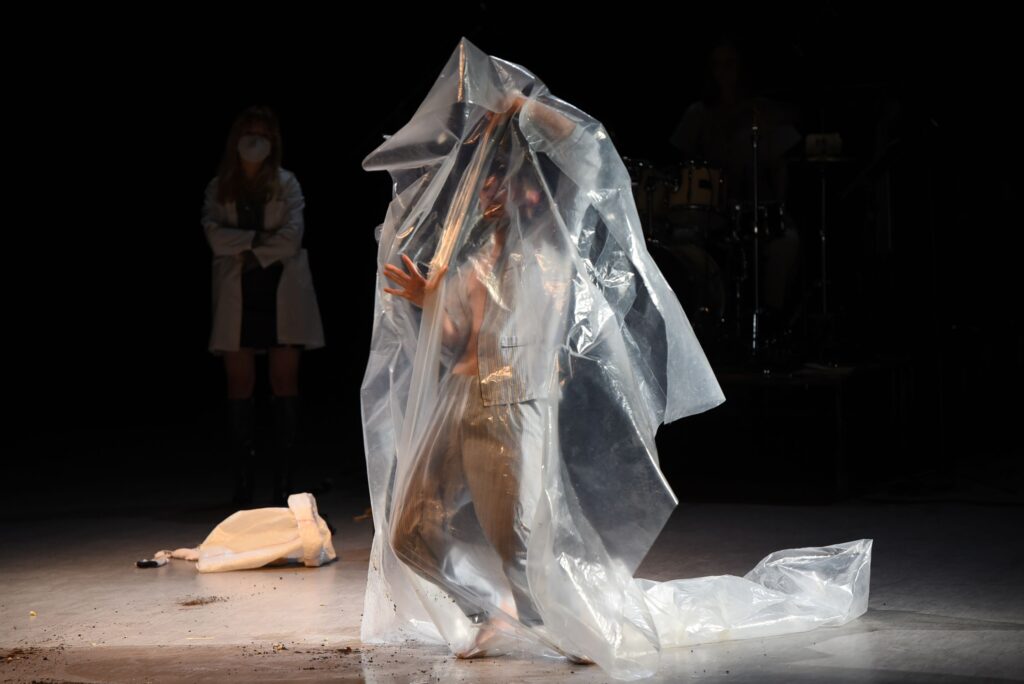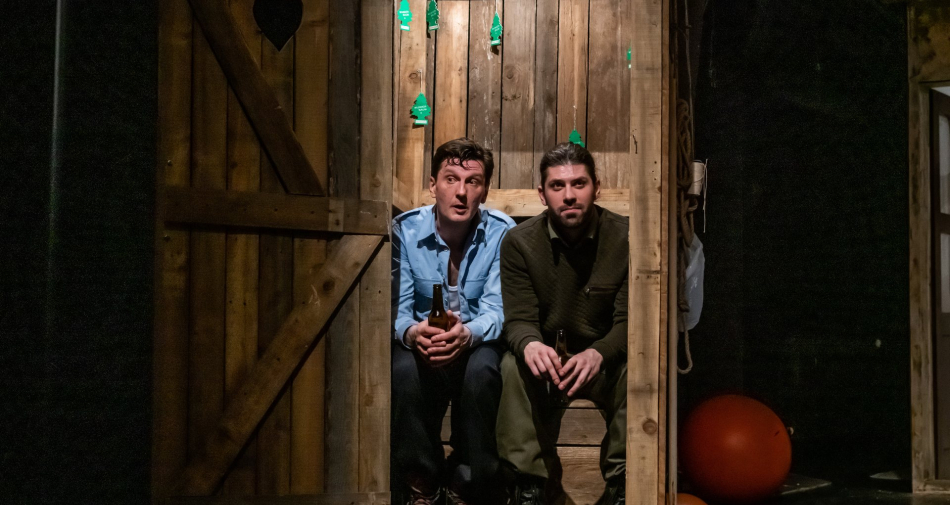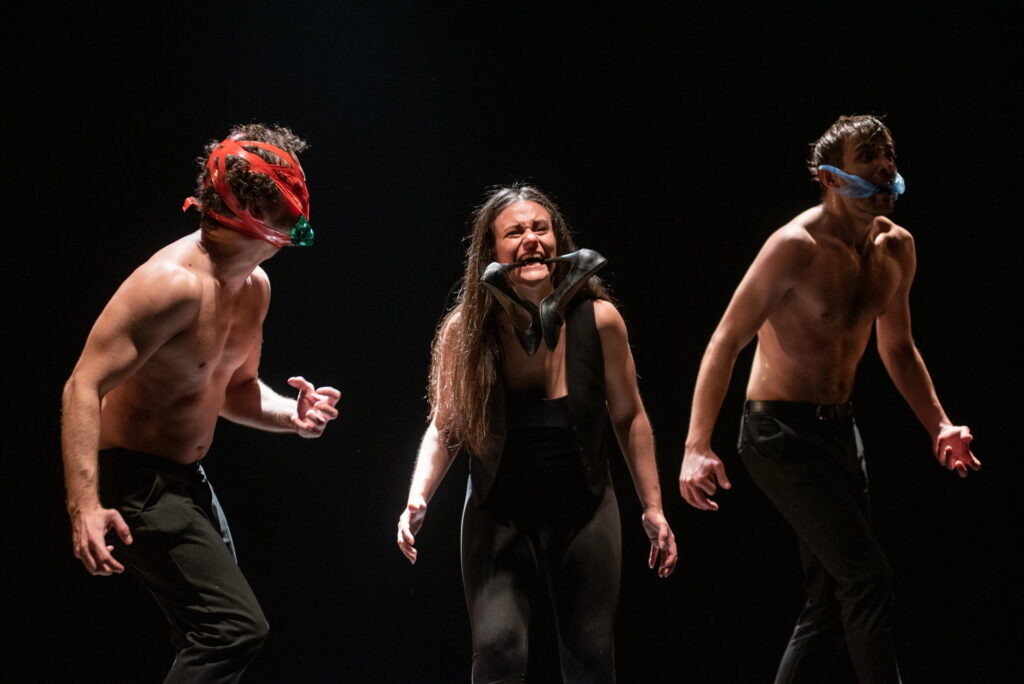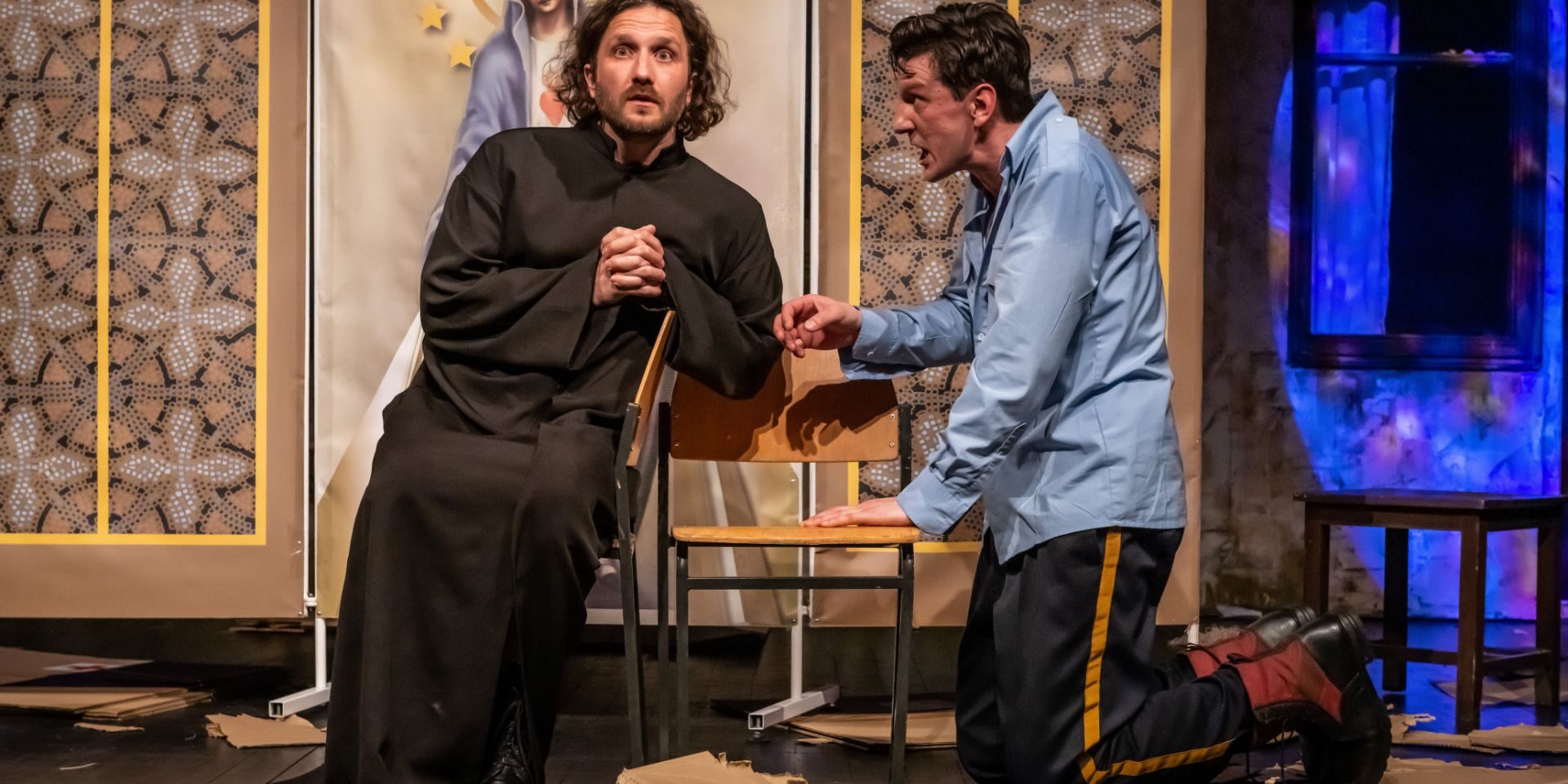Andraš Urban is one of the most provocative and prolific directors in Serbia. Andrej Čanji explores the particular mix of flavours and ingredients that make up his work, as presented in three performances at last year’s Desiré Central Station festival.
We tend to forgive classical artists for the repetition of motifs and stylistic uniformity, but when a contemporary artist develops his own recognisable mode of expression, we sometimes end of accusing them of lack of inspiration and imagination. While it is true that some artists do repeat themselves for these reasons, other use repetition as a way of expanding their imaginative universe. There is an immeasurable gap between the two forms of repetition.
When it comes to theatre in Serbia, no one is criticised as often for continuing to create work in the same way as Andraš Urban. On countless occasions I have heard him accused of repetition. But although this argument may apply to him to a certain extent, it is not tenable as a judgement of his work, because he is an incredibly productive artist. Even his lesser works are well above the average in Serbian theatre. Even so, both those who love his work and those who decidedly do not love it, tend to say that Urban is a director who repeats himself at times and whose performances resemble each other. The artistic signature of this director is so recognisable that Dr Mina Stanikić, when she was still writing excellent theatre reviews, constructed the term Urban-recipe in a text about Urban’s production of Marx’s Capital under the title “Four Microphones, two bands”.
Although he works all over the region, Urban is most present in theatres in Serbia. He stages work most often in Vojvodina, especially in the Hungarian theatres “Kosztolányi Dezső” in Subotica, where he was director from 2006 to 2023, and “Újvidéki Színház” in Novi Sad, where he has recently become director. His work can often be seen in Belgrade and the rest of Serbia. His work is also often presented at the Desiré Central Station festival, which he founded and continues to direct.
You don’t need much knowledge of the theatre scene in Serbia and the region to recognise a play created according to Andraš Urban’s recipe. Intense flavours and strong spices feature frequently. Actors are often served up naked with a side dish of curse-words and screaming; politicians are sometimes roasted on a spit and the audience is sometimes stewed on stage.
Urban himself can sometimes become an ingredient in his own cooking, as was the case of the play Wanton Lady’s Knights. This director listens to public opinion about him and incorporates different ingredients into his recipes. He mixes the polyphony of discourse in such a way that you end up with the aftertaste of a critical attitude towards everything you have eaten.
His kitchen is not one for refined gourmets, but one in which food is often served at boiling point. There is loud music, provocation both verbal and visual – and microphones. There are always microphones. There is usually no room on his theatrical menu for tenderness or love, but you can reply on things being served explicitly, powerfully and overwhelmingly.
Urban is a master of variation. He pays particular attention to the choice of ingredients and uses different culinary techniques to combine them. There are three dominant trends in his recipes. The first, most striking feature of Urban’s cook book is his uncompromising political commitment. Another feature is the sharp, satirical humour, which usually evokes two opposing reactions: uncontrolled laughter and existential bitterness. The third characteristic is a tendency to play with the form of theatrical expression and to experiment with the possibilities of theatrical communication.
At this year’s Desiré Central Station festival, there were three Urban performances – a three-course feast.

Ko Igra Sonja Savić (Čačak City Theatre and Bitef Theatre)
First course: Who plays Sonja Savić (Čačak City Theatre and Bitef Theatre)
Urban’s trademark, his most recognisable feature – an interest in the social and political conditions of the present – has its very own expression. Several actors lined up symmetrically on stage, facing the audience and armed with microphones, singing loudly, reciting slogans, repeating words and swearing throughout most of the play – this is the backbone of the director’s approach in many of his plays, incuding Hasanaginica, Kapital, Rodoljupci, M.I.R.A. and, most recently, Who Plays Sonja Savić.
The famous Yugoslavian actress Sonja Savić is not only known for her distinctive acting skills, but also for numerous public appearances in which she criticised everything that caught her eye like an unguided missile. If you make a theatre piece about Sonja Savić, you have to talk about her rebellious nature. And when you’re talking about a rebellious artist whose character was so distinctive that it transcended all the roles she was known for, it’s not enough to limit her messages to the traditional framework of dramatic representation. Therefore, in the play, she becomes not the subject but the means to raise the question of the role of the artist in society. The question raised by the title of the play can thus be translated into the thesis that work within the institution of art is inadequate if the personality of the artist outside the fictional context is deaf and uninvolved in the problems of his immediate environment. In other words, culture cannot be isolated as an independent, autonomous activity from other areas of social life.
Although the content largely consists of the furious recitation of parts of Sonja Savić’s numerous interviews, three aspects of this piece, which are not part of her public performances, stand out as an essential part of its success. Firstly, during the performance, actress and musician Julija Petković accompanies the four-member ensemble with a rhythmic drum roll by composer Irena Popović Dragović. This maintains a constant state of tension.
Two brilliant scenes stand out as a contrast to this auditory intensity. In one, Bratislav Janković tortures himself by pouring salt water into his mouth while uttering words of gratitude to the audience for coming, to the theatre for its existence, to the local authorities who approved funding for the play, and so on. Thanks also go to the Prime Minister and the President, to all the indirect and direct authorities who made the performance possible. The real context in which the play was created must not be ignored. By equating themselves with the state, ruling party MPs and senior state officials accuse the actors (who criticise their work) of hypocrisy because they earn their salaries by starring in series and films financed by the state-owned company Telekom, the play ironically mocks the logic of the Serbian Progressive Party, and their attacks on actors, and portrays their ideas of an ideal and grateful artist as ridiculous.
In the second scene, we hear the (pseudo-?) confession of the young actor Nikola Voštinić. He talks about the violence he suffers because of his sexuality, about the fact that he is forced to do other jobs in addition to acting, from which he does not earn enough, and about his disappointment that artistic commitment is perceived as part of the entertainment industry. As a victim of a patriarchal community in the grind of capitalism in which he “works like a dog”, Voštinić delivers a deeply emotional and brutally cruel performance that stands out not only in this production, but in the entire theatre season. He exposes himself literally and figuratively. The confession is followed by an energetic dance in which Voštinić is completely naked except for a large mask in the shape of a dog’s head. While his special male part is frolicking and rollicking around, his female colleague whips him with a rod and forbids him to rest. The scene also shows the absurdity of the idea that it is an actor’s duty to offer only frivolous and lascivious entertainment to the masses by giving his whole self to merciless underpaid exploitation.

Totovi (Sarajevo War Theatre SARTR)
Second course: The Toth Family (Sarajevo War Theatre SARTR)
While Sonja Savić’s captivating metatheatrical authorial project emerged from team research, The Toth Family has a traditional dramatic form. Urban tends towards both types of theatre forms. In addition to Toth’s, his direction of King Ubu (retitled as Ubu the Great, 2021) at the National Theatre Sombor and Shakespeare’s Titus Andronicus (2022) at the Yugoslav Drama Theatre have recently become well known. What all three productions have in common is a tendency to show bloody and brutal violence. Urban often combines cruelty with humour (this is not so much the case with Titus Andronicus), and his comedies are always characterised by dark humour.
The Toth Family, a grotesque satire by the famous Hungarian writer István Ereky from 1967, appears at first glance to be a critique of everyday life in the petty bourgeoisie, accompanied by a mockery of military discipline. A fire chief in a small Hungarian town and his family rent rooms to tourists. Their son on the eastern front sends his superior officer to visit for a few weeks. Knowing how much the officer can influence their son’s well-being, the Tots agree to indulge the major’s every whim. Because the war has made him extremely paranoid and hyper-traumatised, the Major orders the Toth family to make cardboard boxes all day every day because it calms him down. Thrown out of their routine and completely exhausted, the Toths are forced to save themselves in a bloody and merciless way, which is also an allusion to the 1956 Hungarian uprising against Soviet control.
Nevertheless, Urban’s choice of text cannot be considered random. In the Sarajevo War Theatre, in a city besieged during the wars of the 1990s, Toth’s performance takes on a special significance. The Tots live far away from the war, but with the arrival of the officer and his traumas, they indirectly become victims of the horrors of war. The effects of a protracted armed conflict are long-lasting and far-reaching, and comedy is a suitable means of tracing old wounds without reopening them. To be clear: Nothing in The Toth Family refers directly to the time or place of the 1990s or the present. In this rare instance of Andraš Urban’s referential restraint, his keen sense of the connection between the choice of text and the context in which it is set is particularly evident.
In addition to the fact that the performance is well-coordinated, that the jokes are delivered with excellent timing, that the characters are colourful and the scenes exciting, there are also Urban’s typical humorous features. Breaking the fourth wall, witty songs (again, Irena Popović Dragović is another constant of Urban’s success) and unrestrained underbelly humour, enhanced by exaggeration and hyperbole while showing primary needs such as sex, food or distress, are indispensable ingredients. In Toth’s, one of the most important centres of comedy, there is a field toilet and a septic tank from which the actor emerges completely smeared with faeces. Such a faeces-smeared and smelly comedy of situation and frustration ends with Urban’s quick and violent cut, which certainly detracts from the entertainment effect and emphasises the need for caution and reflection.

The Poetics of Silence Kosztolányi Dezső)
Third course: The Poetics of Silence (Kosztolányi Dezső)
The Poetics of Silence follow The Poetics of Observation from 2020, which focused on experimenting with the visual aspects of theatre. In 2023, Urban returns to his research practise in which he questions the auditory realm of theatre. The beginning is characterised by the silence of the empty stage, which is disturbed by the appearance of an actor. He creeps with the intention of prolonging the silence, but his shoes squeak on the crackling stage as he walks. He signals to the audience to be quiet. He wants to speak, but in vain. He tries to say something, but his throat cramps, his mouth is contorted and instead of words only an inarticulate sound comes out of him. It quickly becomes clear that the silence from the title of the play is defined in this context as the absence of speech, i.e. the absence of communication.
As the play progresses, it becomes clear that such a world of silence is on the path to regression, violence, suffering and destruction. Unknown people in black suits on an empty stage possess certain objects: a box of matches, paper, plastic bottles, adhesive tape, a knife, a string of pearls… They initially handle them with curiosity. A knife, for example, becomes a sound object that emits a certain frequency when struck with the fingers. A completely different frequency is produced when the teeth are struck with the knife. The inquiry continues with the discovery of another function of the knife. It reveals its usefulness for cutting buttons off jackets until the actors are naked, and for destroying a string of pearls whose disintegration spills all over the stage.
The absence of speech allows for an obsessive embrace and a violent kiss. Without the expression of thought, the world becomes a place where the concepts of questions, consent, mutual appreciation, respect, togetherness and love are unstable and there is nothing to constrain the rudimentary animal needs of the individual. The Poetics of Silence depicts a world after language. It is on the track of The Poetics of Observation, in which the creation of the world and its destruction are shown. However, it must be emphasised that such interpretations of these Urban experiments are somewhat subjective, as neither play has a traditional narrative in which one situation emerges from another and the scenes correspond with cause-and-effect relationships. Characteristic of this Urban recipe is an ominous associativity guided by a perverted logic of creation and destruction in a post-apocalyptic atmosphere. Although we do not have a clearly profiled paradigm to understand such recipes, we can perceive them on an intuitive level to stimulate thinking towards a better world.
Dessert: proof of abundance
If he were to stage a play with subtle gestures and moments of tenderness and consolation, then one could say that Urban really is capable of anything. But only the insatiable could extract even more variety from his already generous cornucopia. If three completely different performances aren’t proof enough that he does more than use the same ingredients, he mixes them in different ways, then it’s hard to know what more he could do. His constant need to address real social and political issues and question what role art plays in them is proof that his menu is also nutritious, displaying a sense of social responsibility and activist inclination.
Where we to look for another artist who has been making work in Serbia for as long as Urban, with the results he produces, the themes he raises and the forms he explores, we would struggle to find an equivalent. All this leads to the conclusion that Urban is probably the most important theatre director in the country at the moment. Even those who disagree with his excess, his use of violence, his meddling in politics, his cynicism – his microphones – can hardly deny his influence, presence, relevance (and numerous awards). His recipes may not be to everyone’s taste, but they are part of an unstoppable, decades-long, thrilling banquet that can leave no one indifferent.
Further reading: Interview with Irena Popović Dragović: “Our society cherishes the cult of patriarchy”
Andrej Čanji is a theatre critic and theatrologist based in Belgrade.








